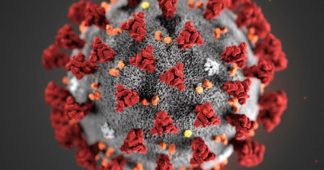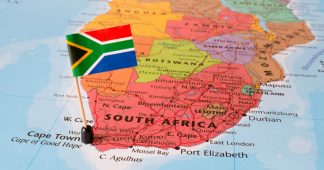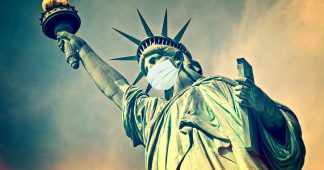Dec. 1, 2021
As December 1 marks World AIDS Day, we look at the pandemic that preceded COVID-19 and how recorded deaths of complications from the coronavirus this year have surpassed those of HIV/AIDS in the United States. The head of UNAIDS has warned the COVID-19 pandemic may result in an increase in infections and deaths from HIV and AIDS. Both viruses disproportionately impacted vulnerable minority communities. Although treatment rollout for HIV/AIDS was uniquely inhibited by homophobia, racism, and sexism, it was also plagued by corporate greed and U.S. exceptionalism. “We’re seeing very similar dynamics again now with COVID-19,” says Steven Thrasher, professor at Northwestern University in the Medill School of Journalism and the Institute of Sexual and Gender Minority Health and Wellbeing. “We have the vaccines, we have medications that are very effective, and they’re again being held from the Global South to protect the profits of pharmaceutical corporations.”
Transcript
AMY GOODMAN: This is Democracy Now!, Democracynow.org, the War and Peace Report. I’m Amy Goodman with Juan González. We end today’s show looking at World AIDS Day, marked every year December 1st. In a new interview the head of UNAIDS, Winnie Byanyima, has warned the COVID-19 pandemic may result in an increase in infections and deaths from HIV and AIDS.
WINNIE BYANYIMA: Now COVID has hit us and is pushing us further off track. We saw especially in the early, the first phase of the pandemic 2020, we saw disruptions in prevention services. We saw fewer people coming to get their prevention tools, fewer people coming for testing, people dropping out of treatment because they were afraid of going to clinics and lining up for a long time or they were restricted by the public safety measures. So we saw disruptions, but communities which are the center of fighting HIV are resilient, are innovative. We saw them fighting back and restoring some of these services. But we do expect that in the coming years, we might see more deaths, we might see more new infections as a result of these disruptions.
AMY GOODMAN: That was UNAIDS Executive Director Winnie Byanyima. We now go to Chicago where we are joined by Steven Thrasher, Professor at the Medill School of Journalism at Northwestern University, faculty member at Northwestern’s Institute of Sexual and Gender Minority Health and Wellbeing. His forthcoming book, The Viral Underclass: The Human Toll When Inequality and Disease Collide. Professor Thrasher, your new piece for Scientific American is just out, Why COVID Deaths Have Surpassed AIDS Deaths in the U.S. Please explain.
STEVEN THRASHER: It is really concerning that it has taken 40 years to get to about 700,000 AIDS deaths in the United States but in less than two years, we have surpassed that number. We are already at about 800,000 COVID-19 deaths. It’s a very different story when you look at it globally. We are at about five million COVID deaths globally, which is much, much less than the 35 million to 40 million AIDS deaths that happened globally. So it is really concerning to think about why the U.S. is such an outlier here and also to think about how can we as a society mourn and effectively think about the people we have lost and deal with our own grief when we are dealing with such an incredible scale of grief in such a little time.
JUAN GONZÁLEZ: Professor, what are some of the comparisons when it comes to inequality and treatment, whether it was for AIDS or in terms of COVID, for testing, and then of course for whatever drugs are brought forth to treat COVID?
STEVEN THRASHER: Your last guest was speaking from Barbados. If you follow the colonial roots of the United States and England and the Global North, you will find enormous disparities around any kind of health thing, particularly around viruses, between the Global North and the Global South. With HIV and AIDS, we first noticed it here in the United States in 1981 and we had a pretty big head start. HIV is a relatively slowly-moving virus within humans. It can take ten to 15 years before someone passes away from it, so we have time. The United States had a lot of time once we got the medication in the mid 1990s to deal with it effectively, to make it so that AIDS deaths never needed to happen again. But those drugs took another seven, eight years to even begin to enter into countries like South Africa, so their death rates continued to spiral and spiral for many years beyond that.
Today there is no reason why anybody should be dying of AIDS. Again, it is a slow-moving virus and so from the time we know someone is infected, we can give them all the support they need. We have the science for it. We have the medicine for it. It is merely a matter of protecting capitalism and the profits of pharmaceutical companies. We are seeing very similar dynamics again now with COVID-19. It’s a much faster-moving virus so there is a need to move more quickly because you don’t have the window of opportunity to get to people. But we have the vaccines, we have medications that are very effective and they are again being held from the Global South to protect the profits of pharmaceutical corporations.
One thing that I do think is significant and gives some measure of hope is that if you look at how marginalized communities dealt with HIV and AIDS, they have really given us the blueprint for how to deal with COVID-19. South Africa, which has been very hard-hit by AIDS and by COVID-19, has also developed an extremely sophisticated genomic surveillance network for looking for pandemics. In mutations of viruses, that is why we know to look at this new variant. Similarly where you are in New York, Amy, the New York City Health + Hospital System had a very robust testing system. At some points they were doing more tests than the entire National Health Service in England. That’s one reason why testing was very effective. They have had an extremely good vaccination rollout program, so you are at about 90% of adults vaccinated in New York and you had no COVID deaths in the past couple of days. So the blueprints for the places that were very hard-hit by HIV and AIDS have given us the tools and the blueprints of what we need to do going forward with COVID.
JUAN GONZÁLEZ: In terms of the lessons of the AIDS pandemic stretching out over decades, your thoughts on the possibility that we may be facing not one, two or three years of a COVID pandemic but actually decades, especially in terms of the fact of the ability of the virus to mutate and new forms staying ahead of the ability of the medical community to come up with vaccines?
STEVEN THRASHER: We don’t have to have anything like the scale of death that we had with AIDS for COVID-19. It does move faster and the countries of the Global North are dragging their feet and not putting muscle into getting these vaccines and technology and resources to make them in the Global South. But if that were to happen, if those of us who are relatively well-protected, who have been able to get vaccinated, can pressure our governments and these corporations to do the right thing, this pandemic does not have to drag on for that long.
There is no vaccine for HIV. There are effective medications that make not only treatment of the person living with it well but make it so that they’re not likely to transmit the virus onward, but there’s no vaccine for it. But there is a vaccine for COVID-19. So we have the tools to end this pandemic in a much quicker period of time. Whether or not the systems of capitalism and colonialism and borders are going to allow for that is the political question we are facing right now.
AMY GOODMAN: The summary of your piece is really the headline and the subtitle. On World AIDS Day, why have COVID deaths surpassed AIDS deaths in the U.S. and why global COVID deaths are a fraction of global AIDS deaths. Continue on that second point.
STEVEN THRASHER: I think that countries around the world and societies around the world have dealt largely with COVID-19 better than the United States. The U.S. has had every advantage of time and money and resources. We were rolling out the vaccines first, but we have dropped to 50 of the countries in terms of our vaccination rate. Other countries have done better measures. Other countries are not as mobile as the U.S. Americans move around quite a bit. We are still allowed to travel around the world to many places. Also this pandemic shows the limits of thinking of the United States as a singular entity. In cities like New York, the pandemic is doing relatively well. In the Deep South, it’s not doing very well in places where there are low vaccination rates and without mask mandates. That is one of the reasons why this has continued to spiral.
I think that we have seen a very different thing with HIV and AIDS which initially entered into specific marginalized communities—gay men, transgender people, people who had been homeless, incarcerated or were dealing with addiction. Those communities dealt with very specific ways to protect one another and learn together how to protect one another. There was no real such thing as what is called bug chasing amongst gay men, where conservatives would accuse gay men of trying to get the virus. That did not happen from the level of gay activists or leaders in any way. But the opposite has happened in the U.S. with COVID-19. We have politicians and radio hosts and conservatives in media who are actively encouraging people to bug chase. They’re telling them to go out and get the virus. They are telling them that this is all a hoax. That has created a very different environment from how HIV and AIDS played out in the United States and a very different environment from how it is playing out in other parts of the world, where if other countries have dealt with pandemics like AIDS before, their leaders are not going to be as likely to encourage their citizens to not take this pandemic seriously.
JUAN GONZÁLEZ: We only have about 30 seconds, but I’m wondering if you could comment on how China, the place where the coronavirus started, has managed to tamp down and almost eliminate the virus?
STEVEN THRASHER: China has had a total number of deaths that are less than some days in the United States. They took seriously the element of time. Once they saw that this pandemic was happening they put all elements of state power together to stamp it out. The United States simply has not done that. We have not taken advantage of the time and the resources we have. We’re going into getting booster shots for vaccines and we haven’t really done everything that we could do with the first round of vaccines to keep this pandemic from playing out in ways that it doesn’t have to.
AMY GOODMAN: Steven Thrasher, we want to thank you for being with us, Professor at the Medill School of Journalism at Northwestern University. We will link to your new piece just out in Scientific American headlined Why COVID Deaths Have Surpassed AIDS Deaths in the U.S. That does it for our show. I’m Amy Goodman with Juan González. Stay safe. Wear a mask.
Published at www.democracynow.org
We remind our readers that publication of articles on our site does not mean that we agree with what is written. Our policy is to publish anything which we consider of interest, so as to assist our readers in forming their opinions. Sometimes we even publish articles with which we totally disagree, since we believe it is important for our readers to be informed on as wide a spectrum of views as possible.











